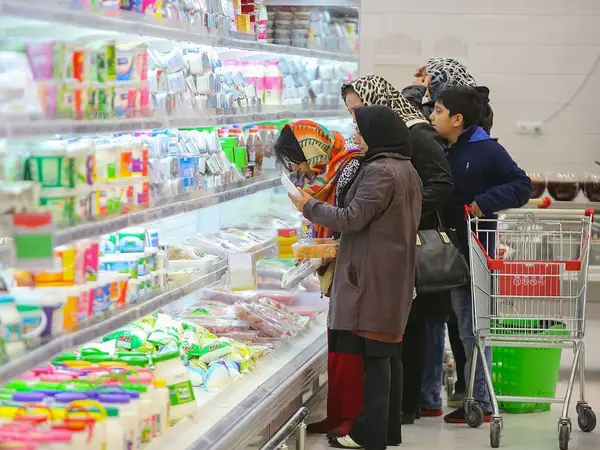The rise in food prices in Iran have been accelerating in recent weeks with two big factors driving food price inflation higher, Ramadan and Nowruz, set to begin in March.
This year Ramadan starts on March 10 and the two-week holidays of Nowruz, which is the start of the Iranian New Year on March 20, lead to a significant increase in food prices, where most people celebrate both with numerous parties and religious events with food as the main glue of the gatherings. Studies have proven that the Muslim fasting month has a significant effect on the inflation of food prices in other countries where the Ramadan is observed, such as Turkey.
The anticipated increase in prices prompts the Islamic Republic to increase its hackneyed measures aimed at price control, including threats to shut down businesses or punitive measures for wholesale middlemen or retailers who do not comply with state-regulated rates. Other measures include supplying subsidized food items, distributing basic goods through state-owned chain stores, and banning exports.
However, these measures have minimal impact as mandated prices often do not correspond to the realities of the market and only lead to confusion and corruption by state companies who control the distribution networks of basic food items such as meat, edible oil, rice, flour, and sugar. Moreover, goods introduced by the government to stabilize the market are typically of low quality and quantity.
According to Iran’s statistics center, which releases a monthly price list of 53 food items among other indices, the general inflation rate in the last Iranian month, which ended December 20, was about 40 percent, in comparison with the same period last year. The prices of about 20 items on the list have increased more than the average inflation, with meat prices hitting over 130 percent.
The price of different kinds of meat or boneless mutton, as announced by official sources, is on average over 5,000,000 rials or about $10 per kilogram. Consumer prices at grocery shops are significantly higher, reaching as much as $20 per kilogram for high-quality products. Compared with an average monthly salary of about $150 to $200 in today’s exchange rates, wage earners cannot afford much meat.
Iran has been experiencing 40-percent inflation for at least three years, as its currency sinks and prices for imported essentials such as animal feed soar.
Last month, the governor-general of Kohgiluyeh and Boyer-Ahmad Province, where meat and chicken prices are higher than those in many other provinces, called for stricter enforcement of government-sanctioned rates. Ali Ahmadzadeh also urged regulatory bodies to prevent price hikes through constructive interaction with retailers and producers.
According to a report by Iran’s state news agency IRNA in November 2023, owners of butcher shops say prices are not reasonable, arguing for example that one kilogram of lamb meat imported from the neighboring Fars province costs about 4,500,000 rials (about $9) net and the government expects them to sell it at a lower price. If butcher shops fail to adhere to the government-approved rates, they not only risk closure but also incur fines.
In April 2018, as the United States was preparing to impose ‘maximum pressure’ sanctions, the rial fell to a then-record market low of around 60,000 against the dollar, the government of President Hassan Rouhani introduced a rate of 42,000 rials to the dollar to facilitate imports of essential goods. The government’s fixed-rate 42,000 rials for one dollar soon became a source of abuse by people who claimed to be importing essential goods, like food or raw materials, and instead imported luxury cars or simply turned around and sold the cheap dollars on the free market making huge profits.
The government began restricting the availability of dollars at 42,000 rials and President Ebrahim Raisi completely ceased the practice in 2022, saving around $15 billion annually, but accelerating food price inflation. The move immediately triggered a massive rise in prices for basic food staples, such as bread, dairy products, cooking oil and meat. In effect an important subsidy was removed, raising food, animal feed and medicine prices.
To compensate, President Raisi pledged to provide meat and chicken to the people at an “approved price” and even distributed special Ramadan handouts of 1.5 million rials (about $5) to 30 million citizens in 2022. The government has made numerous similar promises and announced numerous similar initiatives in the past.






















